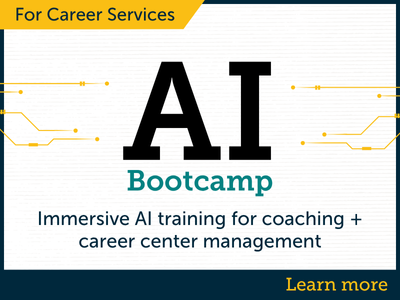NACE Journal, May 2020
There are two types of people in the world of career services: people who know about JLD and those who have not heard about it yet. It is a tad obscure and vague; however, it can have a significant impact on a student’s educational journey and pathway to career success. As a JLD coordinator myself, I have experienced the many benefits of this program being housed in the career services office on my campus.
What Is JLD?
What is the job location and development (JLD) program? JLD is a federally funded offshoot of the federal work study program, which connects students of financial need to part-time employment. Unlike work study, JLD aims to help students regardless of financial need. The program provides funding primarily to cover the salary of the JLD coordinator, who locates and develops part-time jobs off campus for students. JLD coordinators also collect data and compile and submit a report annually to the federal government that details the number of students for whom jobs were located and the total earnings of those students.
The program structure relies on the coordinator to determine how the program should be set up. In most cases, the coordinator conducts site visits to local employers while also maintaining the university’s job posting service. Typically, when the position is housed in career services, the coordinator provides career coaching through one-on-one student appointments.
Where Can I Find JLD on My Campus?
The challenge with JLD is that it can be housed in many different departments on campus. The program can fall under career services, financial aid, student employment offices, and, in some cases, human resources. (As you can probably imagine, collaborating with JLD coordinators across the state, let alone the nation, can be tricky. Sometimes you may have to visit numerous departmental websites to find the JLD coordinator.) In my case, the JLD program falls under career services, and I advise students on how to identify and obtain positions.
However, from my perspective, I believe there is an added impact to the program being housed in the career services entity on campus. Looking through the employer relations and career-advising lens, there are numerous benefits. Additionally, a JLD coordinator who is knowledgeable about different career theories is better able to help students tie these seemingly “unimportant” work experiences to their future goals and next steps.
Employer Relations and JLD
For the employer relations side of the house, JLD offers a whole other network of employers to find and with which to connect. This is another opportunity to build your employer engagement profile and bring employers to campus we had not thought about while also building a connection between the university and the local community. For example, a business owner who runs several dining establishments in the area could present to a group of entrepreneurship majors while also recruiting service workers for the summer.
In addition to employer engagement, this program provides the opportunity to create more part-time job fairs. While other offices may not always have the bandwidth or time for these, career services is where job fairs thrive. In my office, we plan to pilot a part-time job fair by tapping into employers that hire students for part-time summer work.
Career Development and JLD
Housing JLD within the career services office allows the coordinator to look at the program from a career developmental lens. For example, the JLD coordinator can assist with resumes and other job-search documents to solidify the student’s pathway to a part-time position. In addition, following the part-time experience, the JLD coordinator can assist students with how to portray their part-time work experiences on their resumes and coach them on how to speak about such experiences with graduate schools and employers offering full-time positions.
As career professionals, we know how significant a part-time job can be in the next step after graduation, but the student does not always realize that. For example, a senior majoring in engineering who worked at a retail store during his or her freshmen and sophomore years may be having difficulty explaining how this experience could be relevant to full-time engineering positions. Through our career development lens, we can explain the NACE career readiness competencies to the student and share how these eight core aspects can help a new college graduate succeed in the workplace. We can speak about how the student’s part-time work—which included becoming a shift supervisor—relates to those competencies, including teamwork, professionalism, and leadership. In this case, the student’s coursework and internships relate directly to engineering, and the transferrable skills the student developed from the retail job will demonstrate that the student can be a dedicated and professional worker, making the student attractive to many engineering employers.
Incorporating theory
If JLD is housed in the career services entity on campus, the program coordinator is also equipped with theory to help support the importance of part-time jobs and is better able to market them to students.
For example, the coordinator may use the cognitive information processing (CIP) approach, developed by researchers at Florida State University, which is focused on career thinking and decision-making. One component of this theory is the information processing pyramid. Each component of the pyramid focuses on three domains: executive processing, decision-making skills, and knowledge domains. These represent everything one must analyze before making a career-based decision. The knowledge domain focuses on one’s own interests and skills. In thinking about their part-time jobs, students are given an opportunity to see what skills they are good at and others that they need to build on.
Having the knowledge of theories such as the CIP approach allows the JLD coordinator to relate these part-time work experiences to a student’s career goals and aspirations.
Where Do We Go From Here?
JLD is a federally funded program that does not always get the time and attention it deserves from colleges and universities. JLD can provide students with financial stability and a platform on which to build their skills during their collegiate journey.
For those colleges and universities that do not currently have a JLD program, I hope you will look into the possibility of establishing one on your campus. For campuses where JLD has been established in offices other than career services, I urge you to reach out to these campus partners and find ways to collaborate. And, for institutions where JLD is housed in career services, I encourage you to find innovative ways to market this program, connect with these employers, and create partnerships between the students and these opportunities that can await them.
The partnership between JLD and career services can be impactful: The ability to combine and leverage JLD’s strengths with career advising, employer relations, and career theory perspectives is a strong case for establishing this program within the career services office.






